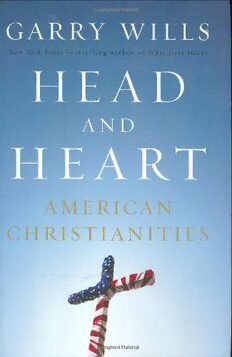
Head and Heart: American Christianities PDF
636 Pages·2007·14.162 MB·English
Most books are stored in the elastic cloud where traffic is expensive. For this reason, we have a limit on daily download.
Preview Head and Heart: American Christianities
Description:
A landmark examination of Christianity's place in American life across the broad sweep of this country's history, from the Puritans to the presidential administration of George W. Bush. The struggle within American Christianity, Garry Wills argues, now and throughout our country's history, is between the head and the heart: between reason and emotion, Enlightenment and Evangelism. Why has this been so? How has the tension between the two poles played out, and with what consequences, over the past 400 years? How ''Christian'' is America, after all? Garry Wills brings a lifetime's worth of thought about these questions to bear on a magnificent historical reckoning that offers much needed perspective on some of the most contentious issues of our time. A religious revolution occurred in America in the 18th century, one that saw the emergence of an Enlightenment religious culture whose hallmarks were tolerance for other faiths and a belief that religion was a matter best divorced from political institutions-the proverbial ''separation of church and state.'' Wills shows us just how incredibly radical a departure this separation was: there was simply no precedent for it. To put this leap in perspective, Wills provides a grounding in the pre-Enlightenment religion that preceded it, beginning with the early Puritans. He then provides a thrillingly clear unpacking of the steps, particularly Madison's and Jefferson's, by which church-state separation was enshrined in the Constitution, and reveals the great irony of the efforts of today's Religious Right to blur the lines between the two. In fact, it is precisely that separation that has allowed religion in America to flourish since the disestablishment of religion created a free market, as it were, and competition for souls led to the profusion of denominations across the length and breadth of the land. As Wills examines the key movements and personalities that have transformed America's religious landscape, we see again and again the same pattern emerge: a cooling of popular religious fervor followed by a grassroots explosion in evangelical activity, generally at a time of great social transformation and anxiety. But such forces inevitably go too far, provoking a backlash as is happening right now with the forces of Creationism and the anti-abortion fundamentalists. Garry Wills closes with a penetrating dissection of the Religious Right's current machinations and the threat they pose to the enlightened religion that has proved to be such a fertile and enduring force throughout American history. But in the end, Wills's abiding message is to be vigilant against the triumph of emotions over reason, but to know that the tension between the two is in fact necessary, inevitable, and unending.
See more
The list of books you might like
Most books are stored in the elastic cloud where traffic is expensive. For this reason, we have a limit on daily download.
